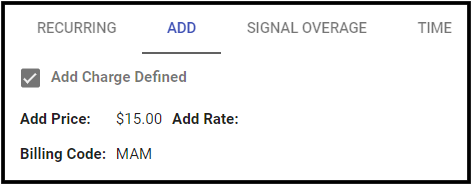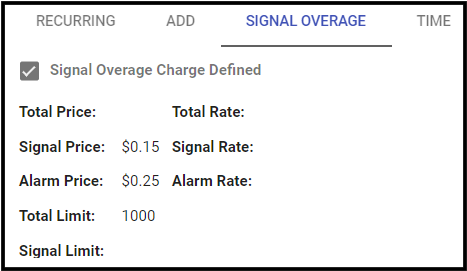Billing Charges can be set up on a Recurring, Add, Signal Overage, or Time basis.
Recurring
 Set up a Recurring charge if the service occurs on a monthly, annual, or other basis.
Set up a Recurring charge if the service occurs on a monthly, annual, or other basis.
For example, with an active price, a $10.00 charge is assessed every month for alarm monitoring. Change the frequency of the charges and also charge for an inactive account. If the account is inactive, but the Monitoring Company is still monitoring the site, apply the inactive rate.
Remember, in the Billing Code field, add the Billing Code for the service defined on the Monitoring Types card in the Manitou Supervisor Workstation. This must also match the Billing Code in the accounting software.
Fields
- Item Code – The Manitou billing identifier for the entry.
- Recurring Charge Defined – This check box enables the Recurring Charge for the selected Dealer and allows input into the related fields.
- Active Price – The fee being charged for a particular active service.
- Active Rate – The Manitou billing identifier based on certain requirements for the Active Rate.
- Inactive Price – The fee being charged for a particular inactive service.
- Inactive Rate – The Manitou billing identifier based on certain requirements for the Inactive Rate.
- Frequency – The regularity at which a given price/rate can be charged.
- Billing Code – The billing identifier that controls how the charges are generated for a process or service.
Add

An Add charge in circumstances where a one-time charge might be applied to added accounts within the billing period, such as a set-up fee.
Fields
- Item Code – The Manitou billing identifier for the entry.
- Add Charge Defined – This check box enables the Add Charge for the selected Dealer and allows input into the related fields.
- Add Price – The one-time fee being charged for a particular service.
- Add Rate – The Manitou billing identifier based on certain requirements for the one-time rate.
- Billing Code – The billing identifier that controls how the charges are generated for a one-time fee.
Signal Overage

Using the Billing Charges card for Signals allows the Monitoring Company or Dealer to bill based on the number of overage signals received in a given time period. As required, enter specifications based on the total price, or by signal and alarm price.
Fields
- Item Code – The Manitou billing identifier for the entry.
- Signal Overage Charge Defined – This check box enables the Signal Overage Charge for the selected Dealer and allows input into the related fields.
- Total Price – Select a Total Price for Signal Overages that occur.
- Total Rate – The Manitou billing identifier based on certain requirements for the Total Rate.
- Signal Price – The fee for Signal Overages based on per signal.
- Signal Rate – The Manitou billing identifier based on certain requirements for the Signal Rate.
Selecting <use price> option will use the price entered into the Signal Price and Alarm Price fields. Selecting Basic Alarms will use the price for basic alarms, and selecting False Alarms will use the rate based on False Alarms. These rates are determined on the Billing Rates card.
- Alarm Price – The fee for Signal Overages is based on per alarm.
- Alarm Rate – The Manitou billing identifier is based on certain requirements for the Alarm Rate.
- Total Limit – The maximum number of Signal and Alarm Overages allowed before overage charges occur. Entering a value here precludes the Signal and Alarm limits. Do not enter values in total as well as signal and alarm limits.
- Signal Limit – The maximum number of Signal Overages allowed before overage charges occur.
- Alarm Limit – The maximum number of Alarm Overages allowed before overage charges occur.
- Billing Code – The billing identifier that controls how the charges are generated for an overage fee.
Time Charges
 The Time Charges card allows for time-based billing items. The Time Increment value determines the value to which each specific time charge (per signal event) will be rounded. For example, if the time spent on an alarm is 6 minutes and 45 seconds, the time rounds to 7 minutes.
The Time Charges card allows for time-based billing items. The Time Increment value determines the value to which each specific time charge (per signal event) will be rounded. For example, if the time spent on an alarm is 6 minutes and 45 seconds, the time rounds to 7 minutes.
Use time-based billing in conjunction with soft programming attributes that are attached to Event Codes. This programming attribute is "q" and can be set in the Manitou Supervisor Workstation under Events | Event Codes. The signal processing system will recognize the new attribute and set a new flag on the Customer Activity record to indicate that time-based billing is active for the event.
Fields
- Item Code – The Manitou billing identifier for the entry.
- Time Charge Defined – This check box enables the Time Charge for the selected Dealer and allows input into the related fields.
- Time Price – Select a price per a selected unit of time for billing purposes.
- Time Rate – The Manitou billing identifier based on certain requirements for the Time Rate.
- Time Unit – The measurement of time to the Time Price.
- Time Limit – The extent of time used for the Price Time. For example, a Time Price of $1.00 is used for every 10 minutes (600 seconds) spent on an alarm.
- Time Increment – This determines the value to which each specific time charge (per signal event) will be rounded. For example, if the time spent on an alarm is 6 minutes and 45 seconds, the time rounds to 7 minutes.
- Billing Code – The billing identifier that controls how the charges are generated for a time-based fee.